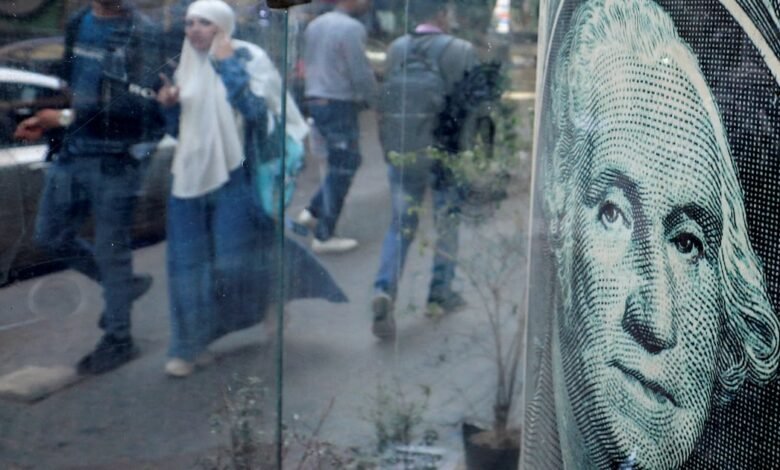How is Egypt benefitting from $50bn foreign financing boost?

Egypt received a much-needed financial bonanza in the first quarter of this year.
The country signed several financing agreements with regional and international partners totalling more than $50 billion, as it struggled to stabilise its economy. Egypt has faced soaring consumer prices and a foreign currency crunch amid a deepening economic plunge.
The Egyptian government has been quick to introduce a number of reforms and policy changes in line with its economic plan that lean towards more privatisation and less public spending.
The funds it received have so far been used to put out the most critical fires, so that it has enough of a foundation to build economic growth in the future. While there are plenty of sectors in need of financial rehabilitation, some have made progress as result of foreign financing.
Food prices ease
A major area of concern for the Egyptian population has been the cost of essential food items such as sugar, cooking oil and rice, which tripled in price since 2022 when inflation began to climb. It remains high at 35.7 per cent.
After signing a $35 billion deal with a UAE consortium to develop a community called Ras El Hekma on Egypt’s Mediterranean coast, Cairo announced in late February that it would spend $100 million on importing food to increase supply in the market and bring down prices.
This promise has been kept over the past week, with the price of cooking oil and sugar dropping by 20 Egyptian pounds, to 60 pounds and 40 pounds ($1.26 and $0.84), respectively.
FX troubles abate
A foreign currency crunch, which began following massive capital outflows from Egyptian banks in 2022 as a result of Russia’s invasion of Ukraine, caused goods to pile up in Egypt’s ports. Many of the goods even expired while in storage awaiting the securing of dollars by importers, according to statements from the Cairo Chambers of Commerce.
The pile-up was at odds with Egypt’s customs law, which stipulates that any goods left at a port for more than four months become the property of the customs’ authority. The authority can resell them or transfer them as it sees fit.
This law had been suspended since 2022, according to a statement on Tuesday by the customs authority. But it has been reactivated since the arrival of more foreign currency at the nation’s banks.
The authority will seize any goods that have been unclaimed as of March 31 and resell them as “neglected goods”, the statement said.
The easing of the FX situation came after cash inflows from the deal with the UAE also facilitated the finalising of an $8 billion package from the International Monetary Fund that had been in progress since 2022. That was followed by two more deals, one with the EU, under which $8 billion would be given to Egypt, and another with the World Bank worth $6 billion.
The IMF conducted its first and second reviews of Egypt in March before the announcement of the deal, and the first tranche of $820 million has been transferred to the government, the IMF mission chief Ivanna Hollar said at a press conference on March 29 in Cairo.
The IMF will complete its third review of Egypt by the end of June, she said.
Egypt devalues currency to record low
The availability of more foreign currency also resulted in banks returning to issuing letters of credit from and to importers, which had been halted since 2022. Importers were securing dollars for imports from parallel markets where exaggeratedly high exchange rates dramatically increased prices for the public.
But following the UAE deal, the governor of Egypt’s central bank, Hassan Abdullah, said in a statement that he instructed banks to allow importers to access foreign currency in a bid to bring down food prices and tackle informal currency markets.
Privatisation makes headway
The cash inflow has also enabled the Egyptian government to make progress on its plan to boost private sector participation and reduce the state’s presence in the economy, two of the IMF’s conditions for approving Egypt’s latest loan.
The director of the Egyptian Electric Utility and Consumer Protection Regulatory Agency, a state authority that co-administers the country’s power sector, told a state newspaper on Tuesday that the government would receive bids from the private sector in a May 1 tender that will lead to portions of the Egyptian power grid being privatised.
The move is also an effort to decrease public spending and cut subsidies, another IMF condition that has thus far been reflected in a 15 per cent increase in fuel prices as of March 22 and rumours of a coming increase in the price of subsidised bread.
The Egyptian Ministry of Electricity’s monthly bill rose by 700 million pounds to two billion pounds following a devaluation of the currency in early March that brought down its value against the US dollar down by 38 per cent. The government hopes to address this challenge with the tender.
The privatisation of the country’s electrical grid follows an announcement in November by Prime Minister Mostafa Madbouly that a tender to sell the rights to operate and administer Egypt’s airports was under way. The tender will include private companies from Egypt and abroad, according to Mr Madbouly’s statement.
Additionally, following an announcement in February that portions of the country’s national airline EgyptAir were going to be sold to the private sector, the company announced on Tuesday that it sold 12 Airbus A220-300s to Russia’s Azur Air.
The move was met with widespread ire and the sale became a talking point on most of the country’s news shows, as Egyptians wondered why the planes were being sold only four years after they were purchased.
Yahya Zakaria, chairman of EgyptAir Holding Company, said the aircraft’s “unsuitability for weather conditions” was the reason for the sale. He did not provide any further details.
In 2021, a group of MPs publicly criticised EgyptAir as a burden on the national budget. The company received a five billion Egyptian pound loan later that year. Mr Zakaria said at the time that EgyptAir was losing 500 million pounds a month after the Covid-induced slump and that the company would be streamlined to increase profit.
More reforms needed
Although the massive capital inflows have certainly bought Egypt some time, serious economic reform is needed to bring the country on to a more stable footing.
President Abdel Fattah El Sisi, who was sworn in for his third term in office on Tuesday, said during his speech that the country’s economy faced a tough road ahead, and that more austerity would be required.
But his critics continue to call for the cessation of the large-scale construction projects Cairo has undertaken at high cost, in favour of more immediately profitable endeavours.
Inflation is expected to remain high and the central bank has tightened its monetary policy to keep people from spending until it cools off, Goldman Sachs said.
Overall, the government’s gross financing needs are likely to remain high, not falling below 30 per cent of gross domestic product in the absence of progress on extending the average duration of domestic debt, Goldman Sachs said in a report this week.
“The debt burden has risen sharply in recent years due to a combination of external financing pressures and tighter financial conditions,” it said.
Goldman Sachs estimates that the overall debt/GDP ratio – including GCC deposits with the Central Bank of Egypt – peaked at more than 112 per cent of GDP in the 2022/2023 fiscal year.
“This is set to fall sharply in the next two years as state asset sales contribute to non-debt budget financing and provide an opportunity for the government to deleverage,” the report said.
“Longer-term, we see strong economic growth and lower financing costs contributing to a steady reduction in the debt ratio to just above 70 per cent of GDP by fiscal year 2033/2034.”
Updated: April 07, 2024, 3:40 AM
Source link






